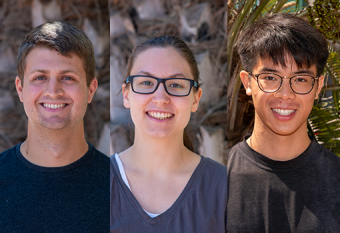
Three chemical engineering PhD students, Daniel Arnold, Elaina Blair, and Titus Quah, have received fellowships for the 2024-’25 academic year from UC Santa Barbara’s Graduate Division. The Central Campus Fellowships are awarded on the basis of merit and promise of productivity.
Arnold, a fifth-year PhD student, received the Betty Elings Wells Dissertation Fellowship, which will fund his research over the summer as he completes and submits his dissertation. Advised by chemical engineering assistant professor Sho Takatori, Arnold studies the spatial organization of proteins and lipids in phospholipid bilayers, much like the ones that comprise the plasma membranes in human cells. By combining the liquid-like behavior of lipid bilayers with the plasticity of the muscle proteins, actin and myosin, he develops model interfacial materials with dynamically tunable properties. These materials may facilitate more efficient and controllable surface chemical reactions, sort and filter solutes, or sense-dilute solutes like nucleic acids or proteins.
“It is an incredible honor to receive this fellowship and to have the support of the Chemical Engineering Department and the Graduate Division as I complete my PhD,” said Arnold, who has accepted a position as a product development scientist for Clorox. “I am also grateful to Betty Elings Wells for her support of UCSB graduate students.”
Quah, who is co-advised by Takatori and professor James Rawlings, works on swarm control, with an emphasis on miniature robots, known as microbots. Often measuring less than 1 millimeter, microbots can be used for material construction, programmable materials, and drug delivery. Quah is working to control and predict the behavior of a swarm by using data-driven and knowledge-based machine learning models. He received a Graduate Opportunity Fellowship, which provides one year of financial support to acquire and develop sophisticated research skills under faculty membership.
“To receive this fellowship is liberating,” said Quah. “I will be able to continue working on my difficult research topic, explore new research ideas, and improve my mentoring skills.”
Advised by professor Michelle O’Malley, Blair engineers stable anaerobic microbial communities capable of converting plant biomass to value-added chemicals, namely medium-chain fatty acids. The fifth-year PhD student received a Graduate Division Dissertation Fellowship, allowing her to focus on completing her dissertation and the associated manuscripts, which she hopes will contribute in a slight, but important, way to the advancement of science.
“This fellowship means people are excited about this research,” said Blair, who plans to enter either the biotech or biopharmaceutical industry after completing her PhD “It’s also a reminder of how many amazing mentors have made it possible for me to obtain this fellowship — from my advisor, Professor O’Malley, to other graduate students and postdocs in the lab, and many others. They have been so crucial throughout my time in the program.”



